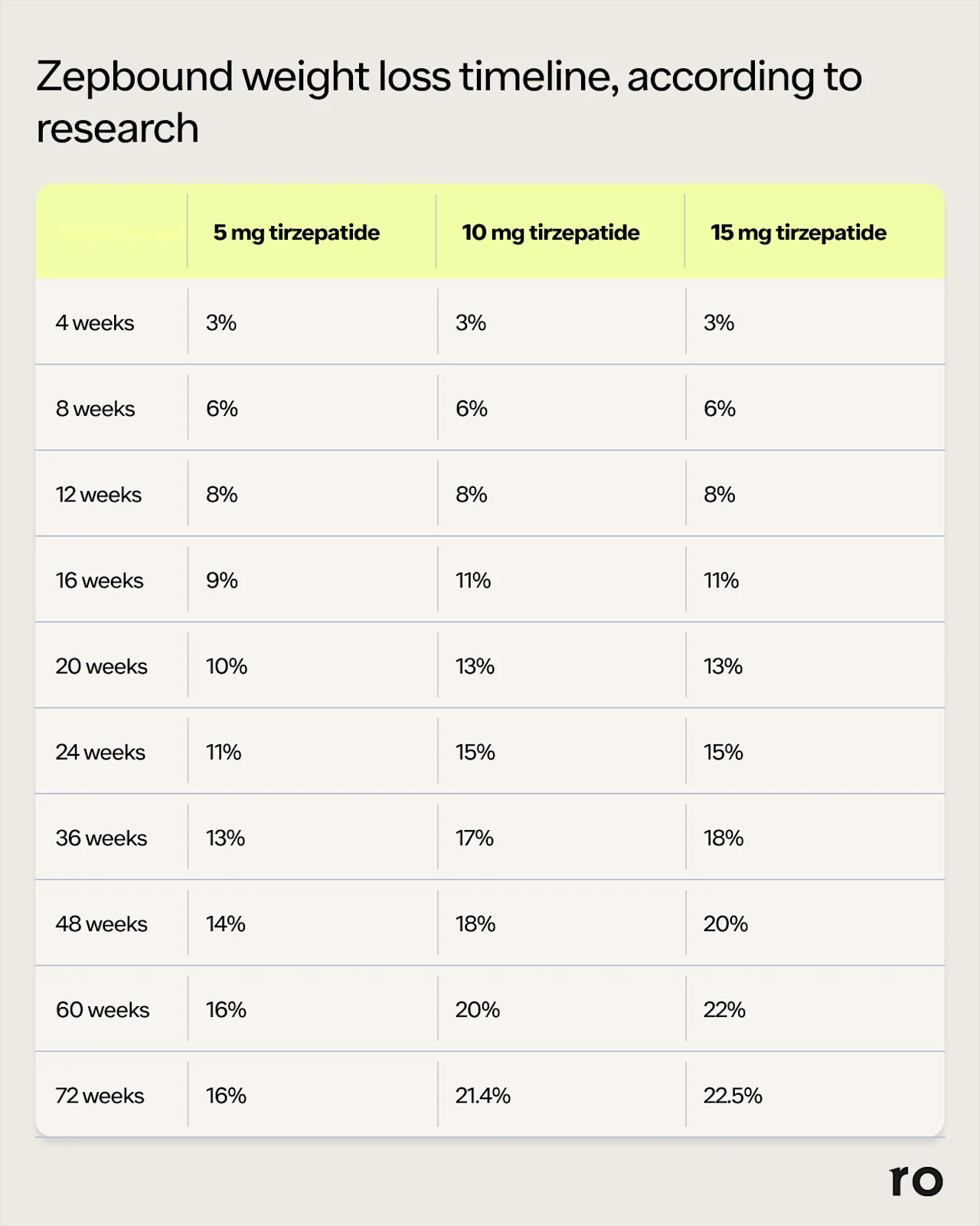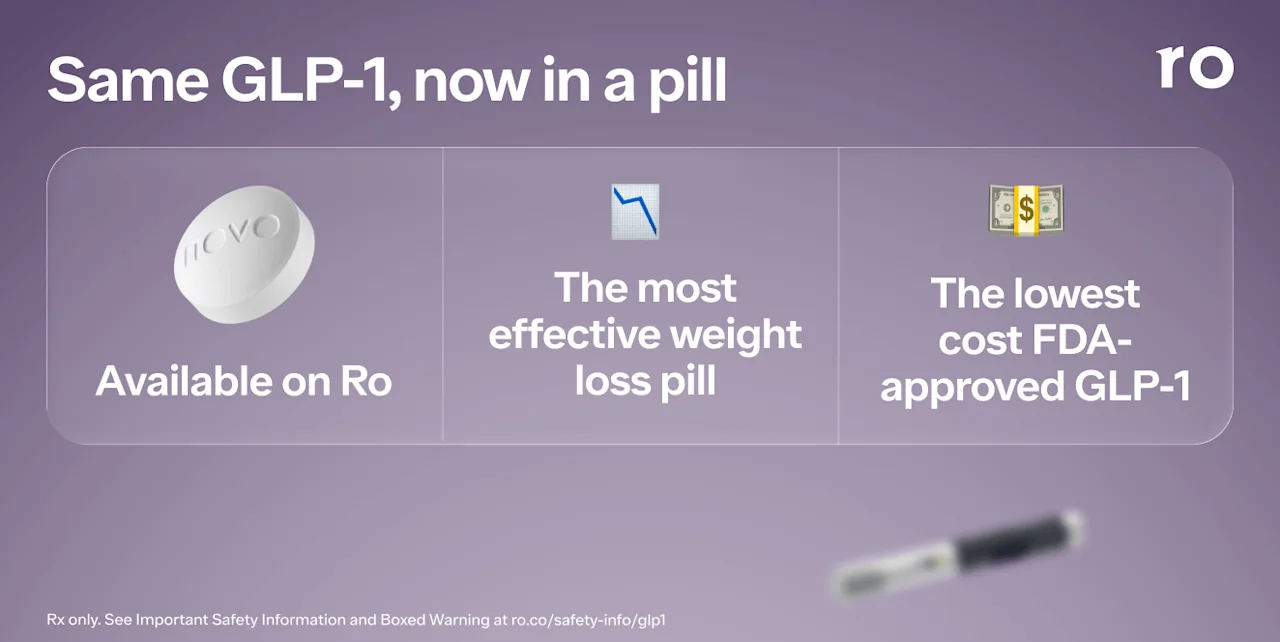Key takeaways
Zepbound starts working in your body immediately, with noticeable weight loss often beginning within a few weeks and peaking around 8–9 months, as seen in clinical trials.
While Zepbound starts working in your body immediately, noticeable weight loss usually begins within a few weeks and continues over many months.
Factors like lifestyle habits, health conditions, and genetics can impact how quickly you see progress.
Staying on schedule with weekly injections and making healthy lifestyle changes can improve and maintain weight loss results.
Here's what we'll cover
Key takeaways
Zepbound starts working in your body immediately, with noticeable weight loss often beginning within a few weeks and peaking around 8–9 months, as seen in clinical trials.
While Zepbound starts working in your body immediately, noticeable weight loss usually begins within a few weeks and continues over many months.
Factors like lifestyle habits, health conditions, and genetics can impact how quickly you see progress.
Staying on schedule with weekly injections and making healthy lifestyle changes can improve and maintain weight loss results.
If you’re thinking about taking the weight loss medication Zepbound (tirzepatide), you’re probably eager to see it take effect quickly. But how long does it take for Zepbound to work?
Like any medication, everyone responds a little differently. But you can expect to start seeing modest results on Zepbound within just a few weeks, and more significant results within a couple of months.
Let’s explore this more closely so you have a realistic idea of what may happen once you start the weight loss medication.
How long does it take for Zepbound to work for weight loss?
It takes about four weeks for Zepbound to reach steady levels in your body, which is when most people start to notice some modest weight loss. One of the major trials of tirzepatide (the active ingredient in Zepbound and Mounjaro) showed participants losing an average of 15%--21% of their body weight over a period of 72 weeks, with more weight loss in those taking the highest dose of the drug.
When you start Zepbound, your healthcare provider will initially prescribe a low starting dose, gradually increasing your dose over the next few weeks and months to minimize side effects while maximizing your weight loss on the medication.
The speed at which you lose weight will depend on a range of factors, including your starting weight, your daily habits (including changes to your calorie intake and how much physical activity you get), and other aspects like any underlying conditions you might have.
One thing to be aware of is you should expect your weight loss to plateau at a certain point — that’s totally normal, and nothing to be concerned about. After all, if you kept losing weight indefinitely, you’d disappear!
In studies, people who lost 20% of their body weight during their first 36 weeks (8–9 months) on Zepbound were able to lose an additional 5.5% if they stayed on the medication another year. But those who stopped taking it regained 14% of the weight they had lost. So, staying on tirzepatide can help you keep the weight off and even shed a little more over time.
Zepbound weight loss timeline
In one of the largest clinical trials on tirzepatide, researchers estimated how much weight participants lost throughout the 72-week study. Here’s a look at the average percentage of body weight lost over time, based on the dose of tirzepatide received:

You’ll notice that the average weight loss stays the same across dosages until week 16, and weight loss at the 10 mg and 15 mg doses stays the same until week 24. That’s because of tirzepatide’s dosing schedule, which involves titration. When starting tirzepatide, you’ll likely start at the lowest dose of 2.5 mg, with your healthcare provider increasing the amount gradually every four weeks.
So, in this study, one group was kept at the 5 mg dose once they reached that level for the duration of the trial, while the other two groups increased their dose as scheduled. And again, when the 10 mg group reached that dose, they stayed there, while the 15 mg dose continued to increase their dose until reaching their maintenance level.
It’s safe to say that modest weight loss begins pretty much immediately after starting tirzepatide (within a few weeks). For most people, weight loss continues as they stay on the medication (with more weight loss happening at higher doses) for about a year, at which point their weight loss levels off.
Another study looked more closely at what happens when people stay on tirzepatide versus stop after the initial weight loss. In the study, adults with overweight or obesity took the highest dose of tirzepatide for 36 weeks and lost about 21% of their body weight on average. After that, some people were switched to a placebo, while others stayed on tirzepatide for another year. Those who switched gained back about 14% of the weight they had lost, while those who stayed on tirzepatide lost a bit more — around another 5.5%.
Your Zepbound weight loss timeline may look different from clinical trial results. Also, keep in mind that trial participants used Zepbound along with a reduced-calorie diet and increased exercise. For instance, in one of the largest studies, participants met regularly with a dietitian or healthcare provider for support in maintaining a balanced diet with a daily 500-calorie deficit and getting at least 150 minutes of exercise each week.
How much weight can you lose on Zepbound?
The amount of weight you can lose on Zepbound varies depending on several factors, including the dosage, individual response to the medication, and lifestyle choices (e.g. diet and exercise). That said, research shows that at the maximum dose of Zepbound (15 mg), you can lose up to about 22.5% of your bodyweight after 72 weeks on the drug. To put that in perspective, if you weigh 275 pounds, that equals losing about 62 pounds.
The higher your dose (up to 15 mg), the more weight you can expect to lose, but not everyone can tolerate the highest dose. Just as results increase with a higher dose, so do potential side effects. You and your healthcare provider may decide that a lower maintenance dose is best for you, depending on your response to the drug.
So, how much weight can you lose on Zepbound at lower doses, according to research?
At 10 mg, you can lose up to 21.4% on average after 72 weeks (about 59 pounds at the same starting weight of 275).
At 5 mg, you can lose up to 16% (or 44 pounds).
While most patients start at 2.5 mg, it is not considered a standard maintenance dose. So, there’s no current research on expected weight loss from extended treatment of the starting dose.
Regardless of the dose, most people can expect to lose a significant percentage of weight as long as they stay on the medication consistently and improve their diet, exercise, and other lifestyle factors with their provider’s guidance.
How does Zepbound work?
Although part of the same drug class as Wegovy, Zepbound differs slightly from other GLP-1 medications in that it targets two hormone receptors: glucagon-like peptide-1 (GLP-1) and glucagon-like peptide-1 (GIP). Zepbound binds and mimics the effects of both GLP-1 and GIP, enhancing the processes these hormones regulate. More specifically, Zepbound:
Slows down gastric emptying, keeping food in the stomach longer, prolonging feelings of fullness, and reducing rapid spikes in blood sugar post-meals.
Sends satiation signals to the parts of the brain that regulate hunger hormones, so you feel less hungry and consume fewer calories.
Quiets “food noise,” reducing cravings and, in doing so, the number of calories you consume.
Regulates blood sugar levels and improves insulin sensitivity, so you avoid blood sugar spikes and crashes that can promote cravings and overeating.
For many people, the common side effects of injectable weight loss medications — nausea, bloating, and other gastric symptoms — also tend to decrease appetite. In most cases, these side effects are mild to moderate and usually get better with time.
Factors affecting how long it takes Zepbound to work for weight loss
Many factors can impact how quickly you lose weight on Zepbound — namely, your lifestyle, how you tolerate side effects, your underlying health conditions, your sex assigned at birth, genetic factors, and how strict you are about taking the medication as prescribed. After all, the average responses shown in clinical trials are just that: averages. That means you might respond better, worse, or the same as what’s shown in trials, based on your personal circumstances.
Let’s take a closer look at some factors that could impact how quickly you respond to Zepbound.
Lifestyle
We know that tirzepatide tends to work considerably better than even intensive lifestyle interventions alone, but the best combination is taking Zepbound while making changes to your diet and physical activity levels.
One review looked at how diet and exercise can help with weight loss on tirzepatide (and improve other health factors). This research suggests that with new anti-obesity medications like tirzepatide, the focus of lifestyle changes may shift from simply losing weight through calorie restriction to helping people adopt healthier lifestyles that improve body composition and overall well-being. For example, researchers recommend prioritizing a high-protein diet along with a strength training regimen to minimize muscle and bone loss while on GLP-1s and similar drugs.
If you thought Zepbound would get you off the hook for diet and exercise, unfortunately, it’s still important to take care of your health in these other ways. And doing so may make Zepbound work better and more quickly.
Tolerance of side effects
When you start Zepbound, your healthcare provider will prescribe a low dose and increase it slowly over time. It generally takes up to five months to safely build up to the maintenance dose range. The higher the dose you’re on, the more weight you’re likely to lose, but you’re also much more likely to experience more side effects at higher doses. So, more doesn’t necessarily equal better. The key is finding the right dose for you.
Everyone experiences and tolerates Zepbound side effects differently, and it’s important to pay attention to what your body is telling you (even if it means you may lose the weight a little slower).
Health conditions
Certain health conditions make it harder to lose weight — namely, and somewhat ironically, type 2 diabetes (T2D). After all, tirzepatide was originally approved as Mounjaro for managing T2D. But we know that people with diabetes taking tirzepatide (and other weight loss medications) lose less weight on average than those without diabetes. Studies show people with diabetes have an average weight loss of around 15% of body weight compared to over 20% in those without diabetes.
Biological sex
When it comes to how well Zepbound works, those assigned female at birth seem to fare better than those assigned male. In one study on weight loss results in people with diabetes, 62.5% of participants at the highest range of weight loss (over 15% of bodyweight) were women, while men made up the other 37.5%. We don’t know why this is exactly, but your sex assigned at birth might be a factor in how quickly you lose weight on Zepbound.
Adherence to treatment
Staying consistent with your weekly Zepbound injections is pretty important for seeing the desired weight loss results. If you don’t take your medication consistently, it’s going to take Zepbound a lot longer to be effective.
There are many reasons people may fall off the wagon, so to speak, with their medication adherence. For many, it’s just a matter of forgetting or losing track of time. If you’re running into that challenge, try setting a weekly alarm or using a medication reminder app, and sign up for automatic refills at your pharmacy to help prevent running out. Your healthcare provider can help guide you if you’re having trouble staying on schedule with Zepbound.
Genetics
Some people respond better to Zepbound than others, and we don’t always know why. There are likely genetic factors that make some people more responsive to GLP-1s and weight loss interventions than others. Unfortunately, that’s not something you can change, but it’s important to be patient and follow your healthcare provider’s recommendations.
How long does Zepbound stay in your system?
Zepbound’s half-life (the time it takes for the drug’s active concentration to reduce by half) is five days, but it can last in your system for up to 30 days.
Zepbound is an injectable solution that comes in a vial or a prefilled autoinjector pen that you’ll administer once a week at the dose your healthcare provider currently has you on. The drug peaks in your system within 8–72 hours, and by that one-week mark, its efficacy has mostly diminished. If you stop taking the medication, however, it’ll take another couple of weeks for it to be completely out of your system after your last dose.
Bottom line
Zepbound is a highly effective medication for weight loss, but results and timing of those results can vary.
You could start seeing modest weight loss within a couple of weeks of starting Zepbound, but for some people, it can take a couple of months to see very significant results.
Most people continue losing weight steadily for a little over a year (16.5 months), with the most noticeable weight loss happening in the first 8–9 months. But studies show that staying on Zepbound long term can help you lose some additional weight, while stopping typically leads to substantial weight regain.
Some factors that can impact how long it takes Zepbound to work include lifestyle interventions, health conditions, your biological sex, adherence to the drug, and genetics.
At the maximum dose of 15 mg, people in studies lost an average of 22.5% of their body weight over a 72-week period.
DISCLAIMER
If you have any medical questions or concerns, please talk to your healthcare provider. The articles on Health Guide are underpinned by peer-reviewed research and information drawn from medical societies and governmental agencies. However, they are not a substitute for professional medical advice, diagnosis, or treatment.
Zepbound Important Safety Information: Read more about serious warnings and safety info.
Wegovy Important Safety Information: Read more about serious warnings and safety info.
GLP-1 Important Safety Information: Read more about serious warnings and safety info.
Mounjaro Important Safety Information: Read more about serious warnings and safety info.
References
Aronne, L. J., Sattar, N., Horn, D. B., et al. (2024). Continued Treatment With Tirzepatide for Maintenance of Weight Reduction in Adults With Obesity: The SURMOUNT-4 Randomized Clinical Trial. JAMA, 331(1), 38–48. doi: 10.1001/jama.2023.24945. Retrieved from https://jamanetwork.com/journals/jama/fullarticle/2812936
Dawed, A. Y., Mari, A., Brown, A., et al. (2023). Pharmacogenomics of GLP-1 receptor agonists: a genome-wide analysis of observational data and large randomised controlled trials. The Lancet. Diabetes & Endocrinology, 11(1), 33–41. doi: 10.1016/S2213-8587(22)00340-0 Retrieved from https://www.thelancet.com/journals/landia/article/PIIS2213-8587(22)00340-0/fulltext
De Block, C., Bailey, C., & Wysham, C. (2023). Tirzepatide for the treatment of adults with type 2 diabetes: An endocrine perspective. Diabetes Obesity and Metabolism, 2023, 25(1), 3-17. doi: 10.1111/dom.14831. Retrieved from https://dom-pubs.pericles-prod.literatumonline.com/doi/10.1111/dom.14831
Farzam, K. & Patel, P. (2024). Tirzepatide. StatPearls. Retrieved on Dec. 9, 2024 from https://www.ncbi.nlm.nih.gov/books/NBK585056/
Hayashi, D., Edwards, C., Emond, J. A., et al. (2023). What Is Food Noise? A Conceptual Model of Food Cue Reactivity. Nutrients, 15(22), 4809. doi: 10.3390/nu15224809 Retrieved from https://pmc.ncbi.nlm.nih.gov/articles/PMC10674813/
Jastreboff, A. M., Aronne, L. J., Ahmad, N. N., et al. (2022). Tirzepatide Once Weekly for the Treatment of Obesity. The New England Journal of Medicine, 387(3), 205–216. doi: 10.1056/NEJMoa2206038. Retrieved from https://www.nejm.org/doi/full/10.1056/NEJMoa2206038
Małecki, M. T., Batterham, R. L., Sattar, N., et al. (2023). Predictors of ≥15% weight reduction and associated changes in cardiometabolic risk factors with tirzepatide in adults with type 2 diabetes in SURPASS 1-4. Diabetes Care, 46(12), 2292–2299. doi: 10.2337/dc23-1135. Retrieved from https://pmc.ncbi.nlm.nih.gov/articles/PMC10698219/
Mozaffarian, D., Agarwal, M., Aggarwal, M., et al. (2025). Nutritional priorities to support GLP-1 therapy for obesity: A joint Advisory from the American College of Lifestyle Medicine, the American Society for Nutrition, the Obesity Medicine Association, and The Obesity Society. Obesity (Silver Spring), 2025, 1-29. doi: 10.1002/oby.24336. Retrieved from https://onlinelibrary.wiley.com/doi/10.1002/oby.24336
U.S. Food and Drug Administration (FDA). (2024). Prescribing Information: Zepbound (tirzepatide) Injection, for subcutaneous use. Retrieved from https://www.accessdata.fda.gov/drugsatfda_docs/label/2024/217806s013lbl.pdf
Wadden-a, T. A., Chao, A. M., Machineni, S., et al. (2023). Tirzepatide after intensive lifestyle intervention in adults with overweight or obesity: the SURMOUNT-3 phase 3 trial. Nature Medicine, 29(11), 2909–2918. doi: 10.1038/s41591-023-02597-w. Retrieved from https://www.nature.com/articles/s41591-023-02597-w
Wadden-b, T. A., Chao, A. M., Moore, M. (2023). The role of lifestyle modification with second-generation anti-obesity medications: comparisons, questions, and clinical opportunities. Current Obesity Reports, 12(4), 453–473. doi: 10.1007/s13679-023-00534-z. Retrieved from https://pmc.ncbi.nlm.nih.gov/articles/PMC10748770















